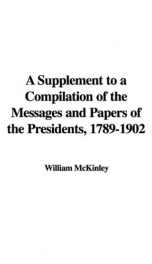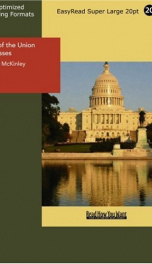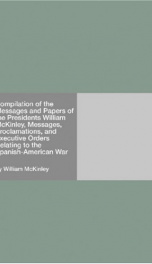McKinley William

William McKinley Jr. (January 29, 1843 – September 14, 1901) was the 25th President of the United States, and the last veteran of the American Civil War to be elected to the office. By the 1880s, McKinley was a national Republican leader; his signature issue was high tariffs on imports as a formula for prosperity, as typified by his McKinley Tariff of 1890. As the Republican candidate in the 1896 presidential election, he upheld the gold standard, and promoted pluralism among ethnic groups. His campaign, designed by Mark Hanna, introduced new advertising-style campaign techniques that revolutionized campaign practices and beat back the crusading of his arch-rival, William Jennings Bryan. The 1896 election is often considered a realigning election that marked the beginning of the Progressive Era. McKinley presided over a return to prosperity after the Panic of 1893. He launched the Spanish-American War, widely popular due to the efforts of the yellow press, using the pretext of Spanish atrocities in Cuba. Later he annexed the former Spanish territories of the Philippines, Puerto Rico, and Guam, and set up a protectorate over Cuba. He also presided over the annexation of the formerly independent Kingdom of Hawaii. McKinley was reelected in the 1900 presidential election after another intense campaign against Bryan, this one focused on foreign policy. After McKinley's assassination in 1901 by Leon Czolgosz, an American anarchist of Polish descent, he was succeeded by Vice President Theodore Roosevelt. Born in Niles, Ohio, on January 29, 1843, William McKinley was the seventh of nine children. His parents, William and Nancy (Allison) McKinley, were of Scots-Irish and English ancestry.[1] When McKinley was nine years old, he moved to Poland, Ohio, where he attended Poland Seminary.[2] He graduated from Poland Seminary and attended Mount Union College, where he was a member of the Sigma Alpha Epsilon fraternity, and attended Allegheny College for one term in 1860. In June 1861, at the start of the American Civil War, he enlisted in the Union Army, as a private in the 23rd Regiment, Ohio Volunteer Infantry. The regiment was sent to western Virginia, where it spent a year fighting small Confederate units. His superior officer, another future U.S. President, Rutherford B. Hayes, promoted McKinley to commissary sergeant for his bravery in battle. For driving a mule team delivering rations under enemy fire at Antietam, Hayes promoted him to Second Lieutenant. This pattern repeated several times during the war, and McKinley eventually mustered out as Captain and brevet major of the same regiment in September 1865. In 1869, the year he entered politics, McKinley met and began courting his future wife, Ida Saxton, marrying her two years later when she was 23 and he was 28. Within the first three years of their marriage the McKinleys would have two daughters, Katherine and Ida, but neither child lived to see the age of five. Following the war, McKinley attended Albany Law School in Albany, New York and was admitted to the bar in 1867. He practiced law in Canton, and served as prosecuting attorney of Stark County from 1869 to 1871. In June 1876, 33 striking miners in the employ of the industrialist Mark Hanna were imprisoned for rioting when Hanna brought in strikebreakers to do the work. McKinley chose to defend the miners in court, and was able to get all but one of them set free. When the miners came to McKinley to pay their legal fees, he refused to accept their money, which they had barely been able to raise. He first became active in the Republican party when he made "speeches in the Canton area for his old commander, Rutherford Hayes, then running for governor" in the state of Ohio.[3] With the help of Rutherford B. Hayes, McKinley was elected as a Republican to the United States House of Representatives for Ohio, and first served from 1877 to 1882, and second from 1885 to 1891. He was chairman of the Committee on Revision of the Laws from 1881 to 1883. He presented his credentials as a member-elect to the 48th Congress and served from March 4, 1883, until May 27, 1884. He was succeeded by Jonathan H. Wallace, who successfully contested his election. McKinley was again elected to the House of Representatives and served from March 4, 1885 to March 4, 1891. He was chairman of the Committee on Ways and Means from 1889 to 1891. In 1890, he wrote the McKinley Tariff, which raised rates to the highest in history, devastating his party in the off-year Democratic landslide of 1890. He lost his seat by the narrow margin of 300 votes, partly due to the unpopular tariff bill and partly due to gerrymandering. After leaving Congress, McKinley won the governorship of Ohio in 1891, defeating Democrat James E. Campbell; he was reelected in 1893 over Lawrence T. Neal. He was an unsuccessful presidential hopeful in 1892 but campaigned for the reelection of President Benjamin Harrison. As governor, he imposed an excise tax on corporations, secured safety legislation for transportation workers and restricted anti-union practices of employers. In 1895, a community of severely impoverished miners in Hocking Valley telegraphed Governor McKinley to report their plight, writing, "Immediate relief needed." Within five hours, McKinley had paid, out of his own pocket, for a railroad car full of food and other supplies to be sent to the miners. He then proceeded to contact the Chambers of Commerce in every major city in the state, instructing them to investigate the number of citizens living below poverty level. When reports returned revealing large numbers of starving Ohioans, the governor headed a charity drive and raised enough money to feed, clothe, and supply more than 10,000 people. Governor McKinley left office in early 1896 and, at the instigation of his friend Marcus Hanna began actively campaigning for the Republican party's presidential nomination. After sweeping the 1894 congressional elections, Republican prospects appeared bright at the start of 1896. The Democratic Party was split on the issue of silver and many voters blamed the nation's economic woes on incumbent Grover Cleveland. McKinley's well-known expertise on the tariff issue, successful record as governor, and genial personality appealed to many Republican voters. His major opponent for the nomination, House Speaker Thomas B. Reed of Maine, had acquired too many enemies within the party over his political career, and his supporters could not compete with Hanna's organization. After winning the nomination, he went home and conducted his famous "front porch campaign," addressing hundreds of thousands of voters, including organizations ranging from traveling salesmen to bicycle clubs. Many of these voters campaigned for McKinley after returning home. Hanna, a wealthy industrialist, headed the McKinley campaign. His opponent was William Jennings Bryan, who ran on a single issue of "free silver" and monetary policy. McKinley was against silver because it was a debased currency and overseas markets used gold, so it would harm foreign trade. McKinley promised that he would promote industry and banking and guarantee prosperity for every group in a pluralistic nation. A Democratic cartoon ridiculed the promise, saying it would rock the boat. McKinley replied that the protective tariff would bring prosperity to all groups, city and country alike, while Bryan's free silver would create inflation but no new jobs, would bankrupt railroads, and would permanently damage the economy. McKinley was able to succeed in getting votes from the urban areas and ethnic labor groups. Campaign manager Hanna raised $3.5 million from big business, and adopted newly invented advertising techniques to spread McKinley's message.[4] Although Bryan had been ahead in August, McKinley's counter-crusade put him on the defensive and gigantic parades for McKinley in every major city a few days before the election undercut Bryan's allegations that workers were coerced to vote for McKinley. He defeated Bryan by a large margin. His appeal to all classes marked a realignment of American politics. His success in industrial cities gave the Republican party a grip on the North comparable to that of the Democrats in the South. McKinley's inauguration marked the beginning of the greatest movement of consolidation that American business had ever seen.[5] He validated his claim as the "advance agent of prosperity" when the year 1897 brought a revival of business, agriculture and general prosperity. This was due in part to the end, at least for the time, of political suspense and agitation, in part to the confidence which capitalists felt in the new Administration. On June 16, 1897, a treaty was signed annexing the Republic of Hawaii to the United States. The Government of Hawaii speedily ratified this, but it lacked the necessary two-thirds vote in the U.S. Senate. The solution was to annex Hawaii by joint resolution. The resolution provided for the assumption by the United States of the Hawaiian debt up to $4,000,000. The Chinese Exclusion Act (1882) was extended to the islands, and Chinese immigration from Hawaii to the mainland was prohibited. The joint resolution passed on July 6, 1898, a majority of the Democrats and several Republicans, among these Speaker Reed, opposing. Shelby M. Cullom, John T. Morgan, Robert R. Hitt, Sanford B. Dole, and Walter F. Frear, made commissioners by its authority, drafted a territorial form of government, which became law April 30, 1900. In Civil Service administration, McKinley reformed the system to make it more flexible in critical areas. The Republican platform, adopted after President Cleveland's extension of the merit system, emphatically endorsed this, as did McKinley himself. Against extreme pressure, particularly in the Department of War, the President resisted until May 29, 1899. His order of that date withdrew from the classified service 4,000 or more positions, removed 3,500 from the class theretofore filled through competitive examination or an orderly practice of promotion, and placed 6,416 more under a system drafted by the Secretary of War. The order declared regular a large number of temporary appointments made without examination, besides rendering eligible, as emergency appointees, without examination, thousands who had served during the Spanish War.
do you like this author?
What readers are saying
What do you think? Write your own comment on this book!
write a commentWhat readers are saying
What do you think? Write your own comment on this author!
write a commentBook list

Compilation of the Messages and Papers of the PresidentsWilliam McKinley,Messages,Proclamations,and Executive OrdersRelating to the Spanish-American War
Series:
Unknown
Year:
Unknown
Raiting:
2.5/5
Show more
add to favoritesadd In favorites

A Supplement to A Compilation of the Messages and Papers of the Presidents
Series:
Unknown
Year:
Unknown
Raiting:
3.5/5
Show more
add to favoritesadd In favorites

State of the Union Address
Series:
Unknown
Year:
Unknown
Raiting:
3/5
ReadHowYouWant publishes a wide variety of best selling books in Large and Super Large fonts in partnership with leading publishers. EasyRead books are available in 11pt and 13pt. type. EasyRead Large books are available in 16pt, 16pt Bold, and 18pt Bold type. EasyRead Super Large books are available in 20pt. Bold and 24pt. Bold Type. You choose the format that is right for you.This is a compilation of the addresses delivered by President William McKinley to the U. S. Congress. The addresses were delivered to fulfil the requirement of the constitution of United States, during the first month of each year. They shed light on the internal condition of the country during the preceding year and also the recommendations by the President to bring about a positive change.To find more titles in your format, Search in Books using EasyRead and the size of the font that makes reading easier and more enjoyable for you.
Show more
add to favoritesadd In favorites
Book list

Compilation of the Messages and Papers of the PresidentsWilliam McKinley,Messages,Proclamations,and Executive OrdersRelating to the Spanish-American War
Series:
Unknown
Year:
Unknown
Raiting:
2.5/5
Show more
add to favoritesadd In favorites

A Supplement to A Compilation of the Messages and Papers of the Presidents
Series:
Unknown
Year:
Unknown
Raiting:
3.5/5
Show more
add to favoritesadd In favorites

State of the Union Address
Series:
Unknown
Year:
Unknown
Raiting:
3/5
ReadHowYouWant publishes a wide variety of best selling books in Large and Super Large fonts in partnership with leading publishers. EasyRead books are available in 11pt and 13pt. type. EasyRead Large books are available in 16pt, 16pt Bold, and 18pt Bold type. EasyRead Super Large books are available in 20pt. Bold and 24pt. Bold Type. You choose the format that is right for you.This is a compilation of the addresses delivered by President William McKinley to the U. S. Congress. The addresses were delivered to fulfil the requirement of the constitution of United States, during the first month of each year. They shed light on the internal condition of the country during the preceding year and also the recommendations by the President to bring about a positive change.To find more titles in your format, Search in Books using EasyRead and the size of the font that makes reading easier and more enjoyable for you.
Show more
add to favoritesadd In favorites

Compilation of the Messages and Papers of the Presidents
Series:
Unknown
Year:
Unknown
Raiting:
3.5/5
William McKinley, the twenty-fifth President of the United States, was born in Niles, Trumbull County, Ohio, January 29, 1843. His ancestors on the paternal side, who were Scotch-Irish, came from Scotland and located in Pennsylvania.
Show more
add to favoritesadd In favorites
What readers are saying
What do you think? Write your own comment on this author!
write a commentif you like McKinley William try:
readers also enjoyed
What readers are saying
What do you think? Write your own comment on this author!
write a commentGenre
if you like McKinley William try:
readers also enjoyed
Do you want to exchange books? It’s EASY!
Get registered and find other users who want to give their favourite books to good hands!

